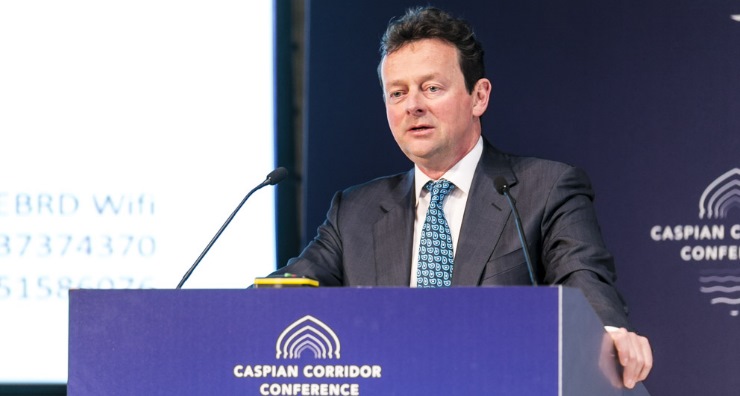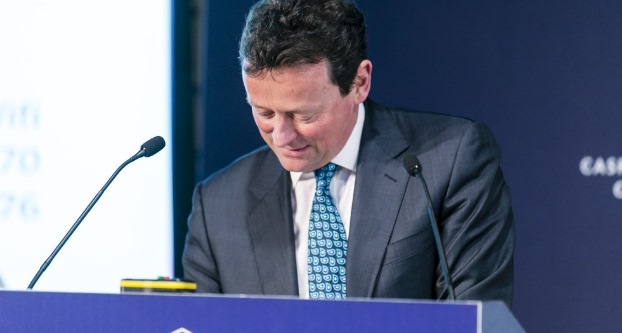Driving commercial and political engagement between Asia, the Middle East and Europe
Driving commercial and political engagement between Asia, the Middle East and Europe
Driving commercial and political engagement between Asia, the Middle East and Europe

A major deal was struck during the 3rd Caspian Corridor Conference held at the European Bank for Reconstruction and Development (EBRD) in London.
Specialist gas-to-liquids company CompactGTL signed a memorandum with the Ministry of Oil and Gas of the Republic of Kazakhstan on 12 March to develop the world’s first small scale gas to liquids (GTL) plant in Kazakhstan.
Oxfordshire-headquartered CompactGTL has over the past nine years developed the world’s first technology to commercially produce diesel from flared gas.
The CompactGTL plant will be located in the Aktobe region of Kazakhstan and will take gas that would otherwise have been flared and instead convert it into synthetic diesel.
Dr. Tony Hayward, chairman of CompactGTL (also chairman of Glencore and CEO of Genel Energy and who is the former Group Chief Executive of BP), who oversaw the signing at the conference, said the memorandum marked a significant milestone in introducing CompactGTL’s new and innovative technology into the region.
He said that transforming flared, shale and stranded gas to diesel at the point of production could “lead to huge environmental benefits.”
Not only did it address the issue of gas flaring but it produced fuel for local consumption, he said.
The economic value of the technology is much greater than the syncrude produced, as it enables the costs associated with gas re-injection, or flaring penalties, to be avoided and can even lead to the development of marginal oil and gas fields.
KazakhOil Aktobe was also meant to sign the agreement to supply the gas to CompactGTL’s first commercial GTL plant, but their representative was struck in Astana because of a snow storm. Their part of the agreement was signed the following day.
Dr Hayward said: “This agreement means we can carry forward the front end engineering of our project. Gas to liquids (GTL) process is of great importance to Kazakhstan. This is an important step in what has been a very long journey. The story of CompactGTL is one of UK technology and it began almost a decade ago in 2006.”
He said at first they built a commercial pilot producing 20 to 30 barrels of diesel a day. “That got us to the point where we were confident. Flared gas to diesel has significant environmental impact in reducing the impact of flared gas whilst providing a valuable product. We believe you need to make it 2,500 to 3,000 a day to make it commercial. This is a world first happening in Kazakhstan over the next few years,” he explained.
The engineering is well advanced and they hope to have the plant operational by early 2018, he said.

Dr. Tony Hayward, chairman of CompactGTL, is pictured signing the memorandum with the Government of Kazakhstan, at the 3rd Caspian Corridor Conference. Copyright Miles Willis Photography
The new GTL plant will contribute to President Nursultan Nazarbayev’s ‘Kazakhstan Strategy 2050’, which aims to generate new sources of economic growth, by creating a local high technology industry that processes associated gas to produce fuels for local consumption. Kazakhstan is a major producer of oil and is also one of the leaders globally in seeking to use new technology to bring environmental benefits to the country.
“This opens the way for very significant deployment of this technology internationally. There are many places where this technology could be deployed. We are delighted to have the chance to do this. We are very excited in this next step of what’s been a very exciting journey,” he said.
“We have negotiated a detailed agreement with the Government of Kazakhstan which is now complete. If we can demonstrate commercial viability in the next decade we will see very widespread deployment in the future,” he added.
naomi.canton@asiahouse.co.uk
To read what Charles Hendry MP, the UK Prime Minister’s Trade Envoy to Kazakhstan, Azerbaijan and Turkmenistan and other speakers had to say about what the Caspian region can offer British businesses click here.
Our next Business & Policy event is the London launch of Asian Development Outlook 2015, the Asian Development Bank’s flagship economic publication. This will take place at Asia House on 27 March, when Juzhong Zhuang, Deputy Chief Economist at the Asian Development Bank, will unveil the findings of the report, which provides a comprehensive analysis of macroeconomic issues in developing Asia, with growth projections by country and region. More information.
